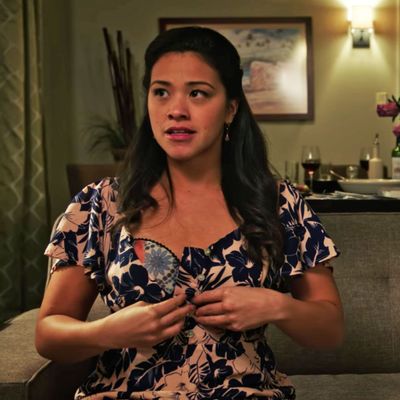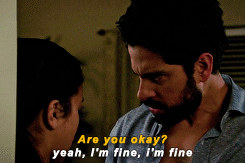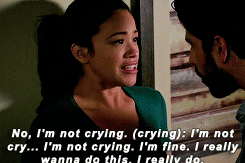
In the pilot episode of Jane the Virgin, a young Jane Villanueva holds a flower in her hand and crumples it up as her grandmother looms above her. “Now, try to make it look new again,” her abuela admonishes. Jane looks on, distraught. “That’s right. You can never go back,” she says firmly. This lesson, about the promise of lost virginity and purity, initially sets the tone for Jane’s relationship to her own sexuality.
I understood how much a lesson like the one Jane’s grandmother had taught her could stick with you. The sect of Islam my family belonged to, the Dawoodi Bohras, practiced female genital cutting, and when I was 7 years old my mother took me for the ritualized cut. As a result, I found sex painful, and carried the trauma associated with remembering what had happened. I also knew why I had been cut: because women were not supposed to enjoy sex or have it outside of marriage. When sex is painful because of a choice someone made for you — a choice made because generations of your elders decided sexual pleasure wasn’t for women — how do you learn to separate shame from sex?
When I started watching Jane, which aired its series finale Wednesday night, I couldn’t help but notice all the ways the show was weaving in the kinds of anxieties I’d been wrestling with inside my own head for years. Like me, Jane had placed such a heavy emphasis on having sex that sometimes the act loomed larger than life. Our fears were different. Jane worried about the consequences of sex outside of marriage. I worried that sex for me might always be bad, or that I’d be too complicated for guys to stick around. For Jane, shame around sex was interlinked with her faith and religion; for me, it was intertwined with my inexperience. But on a fundamental level, I related to how she felt: that no form of intimacy could really be casual.
This manifests in many ways throughout the course of the show. Early in season one, we see Jane try to lose her virginity with Michael, but have far too much anxiety to enjoy it. But later, when she goes skinny dipping with Rafael, desire overcomes her so completely that if she wasn’t interrupted by a pool guard, she likely would have had sex. Both responses are informed by how deeply Jane wants to feel uncomplicated desire. Throughout the series, I liked knowing that both could be true for the same character. There’s one moment in particular that stuck out to me. In the second season, Jane almost loses her virginity in an episode that cut so close to home when I first watched it, I almost stopped watching the show. By this point, Jane’s had her baby, and she’s no longer with Michael or Rafael. She realizes she’s free to date complete strangers, and starts a heavy flirtation with her graduate school adviser, Jonathan Chavez (Adam Rodriguez). Jane tells her mother that she’s going to lose her virginity. It doesn’t have to be a big deal, she’s a mother now, everything is different. One night, Jonathan cooks dinner for her, and afterward, they begin kissing on the couch. He tells her she’s the first person he’s been with since his divorce. It’s not a big deal, he says, but he wanted her to know. Jane pauses. “You’re the first person I’ve been with,” she says. She stops; he looks on confused. Then she continues — she promised her grandmother, it was a whole thing. The mood is ruined. He doesn’t really want to have sex. Jane rebuttons her dress. I turned the episode off.
The scene felt like it was plucked from my own life. I’d been here before, when a guy I’d been on one previous date with invited me over to his place. “I’ll cook,” he’d said. I’d talked it through with friends over frozen margaritas the evening before. “Wait, do I mention that I’m basically a born-again virgin?” My friends had burst into laughter at this description before weighing the pros and cons. We landed on no. “It’s casual, right?” one of them had said, and I’d agreed. “Casual,” I’d repeated, though I wasn’t sure I felt this was true. But at his place, as we started to become intimate, I could feel myself panicking. I had sort of a plan, a thing to say if I didn’t feel ready for sex. When I tried to dig around for those preplanned words, what I said instead was: “I haven’t done this in a very long time because I have a lot of trauma.” Like Chavez, this guy also sent me home, gently telling me that he didn’t know if he or I were ready.
A day later, I tried to watch the episode again. Jane tells her mother what had happened, and Xo suggests that Jane might have self-sabotaged. “Maybe you brought up the virgin thing because you weren’t sure?” she says. I started crying, realizing suddenly that someone who wrote Jane the Virgin might have understood me a little better than I had understood myself. There’s a balance between relating to a character in a television show and seeing them as being a reflection of your life. I never believed that Jane and I were the same person — I wasn’t a young mother with a toddler at home, or in Miami, or co-parenting with someone who looked like Justin Baldoni. But when I watched Jane as she talked out how she was feeling with her mother and grandmother, I always felt like I’d had a conversation, too.
Jane continues to sext the professor. She tells him that by sending her home that first night, he was missing out. He invites her over, turned on by her confident erotic texting. When she sees him rip open a condom, though, Jane starts crying. “I’m fine! I really want to do this!” she says, between tears, to a bewildered Chavez. She comes home, still a virgin.
Eventually, Jane gets married and loses her virginity. The show handles this with sensitivity and grace. It draws a distinction between having sex and having good sex. It weaves in a conversation between Jane and her mother about how Jane feels about losing her virginity. And even after she does, the show’s interest in shame and desire doesn’t disappear. Jane loses her husband, and in the years following his death, her ideas about sex continue to change, too — she has casual sex, and sex with partners she isn’t ready to introduce to her son, and some that she is ready to introduce to her son. Her relationship with her body and other women in her life starts to change, and so does her relationship with the church she was raised in. Perhaps it was because Jane was no longer a virgin and her life had changed so much from those early seasons that I stopped seeing so much of myself in her. I still watched religiously, but my responses to the show weren’t as emotional as they’d been before.
But then, in its fourth season, the show turned its attention to Jane’s grandmother, Alba, in a way I never could have predicted. After Alba turns down Jorge’s marriage proposal, she tells her granddaughter that she’s scared of intimacy, that it’s been 30 years since she’s had sex, and that it’s this fear that prompted her to say no, twice, even though she loved him. “It’s like riding a bike,” says Jane. “No,” says Alba, comparing herself to a broken wheel on the side of the road. “You are not broken,” says Jane. I watch this quiet scene often, if only to hear one woman tell another she’s not broken for not having quite figured out her relationship with sexual pleasure and her body. It’s a beautiful complement to the show’s first scene, in which a stern Alba tells Jane about her purity and virginity; now, Alba is admitting how shame can linger, and Jane is comforting her.
Eventually, Alba does let go of her shame. Jane gets her to use a vibrator and discover her own relationship to pleasure. She marries the man she had turned down, and she does have sex again. My own shame about my inexperience hit a turning point when I decided I needed to have a relationship with my own body, and my own access to pleasure. Jane gently telling her own grandmother that, and then that grandmother finding her way to a healthy sexual life despite her age, was perhaps the most quietly revolutionary arc on the show. Of course, I’m still riddled with fears and anxieties, but I’m grateful to Jane the Virgin, for simply showing women talk through them.




